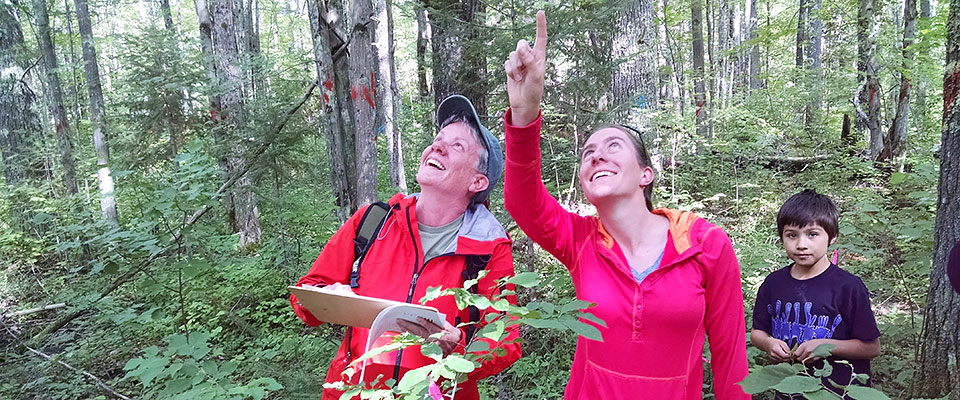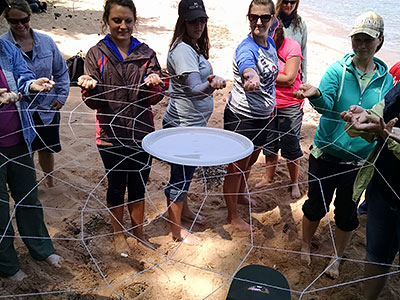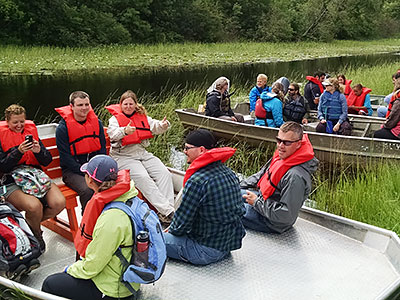
Gikinoo’wizhiwe Onji Waaban (Guiding for Tomorrow, or G-WOW) is a collaboration coordinated by the University of Wisconsin-Extension, which also oversees program design and outreach. The Apostle Islands National Lakeshore-National Park Service provides interpretive outreach. The Great Lakes Indian Fish and Wildlife Commission represents the off-reservation treaty rights and research of 11 Ojibwe Indian tribes within northern Minnesota, Wisconsin, and Michigan, which provide traditional ecological knowledge, research, and educational outreach. The Chequamegon-Nicolet National Forest-US Forest Service provides climate change research and scientific support. The Northern Great Lakes Visitor Center assists with project site logistics and outreach.
Gikinoo’wizhiwe Onji Waaban (Guiding for Tomorrow, or G-WOW) is a unique model for increasing climate change literacy for middle school to adult learners. G-WOW integrates the latest scientific research with traditional ecological knowledge and place-based evidence of how climate change is affecting traditional lifeways of the Lake Superior Ojibwe, and by extension people of all cultures. G-WOW is infused with Ojibwe language and cultural perspectives. The project’s service learning approach promotes community-level action to fight climate change, and the G-WOW model can be adapted to other cultures and locations. Outreach tools include a four-season service learning website, professional development climate institute, and a major climate change exhibit and outreach at the Northern Great Lakes Visitor Center in Ashland, Wisconsin.
- Improve the effectiveness of G-WOW climate literacy outreach by integrating place-based climate change educational outreach tools.
- Promote community-level service learning climate change mitigation/adaptation action.
- Extend the G-WOW climate literacy outreach model through partnerships with other regional and national climate education providers.
G-WOW combines culturally relevant and place-based approaches to climate change education along with service learning to provide a meaningful context for educators and students to learn about climate change and its impacts on ecosystems and cultures. G-WOW used the Connect tools to support and expand the effectiveness of outreach activities and to better support educators in developing service learning projects.
More or Less
A More or Less tool was used at the G-WOW professional development teacher institute to engage participants in considering the ripple effects of climate change and of climate-positive actions, such as planting and maintaining rain gardens. Educators worked in groups to make connections between their actions and climate impacts. Ultimately, they suggested that the More or Less tool could be used as a student assessment as well as an activity by looking at the connections students see between action and effect over time. Educators also suggested allowing students to add their own words to the existing template, increasing the flexibility of the activity and the context in which it could be used.
G-WOW-Project BudBurst website
Connect and G-WOW worked together to create a Community BudBurst page highlighting species of importance to the Lake Superior Ojibwe Indians, encouraging phenology studies that will resonate with native youth and expose all students to traditional ecological knowledge. Project BudBurst is a U.S. citizen science initiative that engages people of all ages in understanding the impacts of climate change on plants and ecosystems by observing plant phenology. The use of culturally relevant keystone species that underlies the G-WOW model is transferable to any culture or ecosystem. You may choose to use the G-WOW Community BudBurst page or create your own BudBurst page highlighting plants that are important to you and your participants.


Primary Project Partners
- University of Wisconsin-Extension: Cathy Techtmann
- Apostle Islands National Lakeshore-National Park Service: Bob Krumenacker, Neil Howk, Myra Foster, Damon Panek, Hayley Bahr, Michael Joyner
- Great Lakes Indian Fish and Wildlife Commission (GLIFWC): Jim St. Arnold, Sue Erickson, Dylan Jennings, Paula Maday, GLIFWC researchers and staff
- Chequamegon-Nicolet National Forest-US Forest Service: Jason Maloney, Paul Strong
Supporting Partners Providing Research, Institute Instructors, and Educational Support
- University of Wisconsin-Nelson Institute, Wisconsin Initiative on Climate Change Impacts: Dr. John Magnuson, Dr. Michael Notaro, Dr. Dan Vimont, Dr. Brian Zimmerman
- Bad River Tribe of the Lake Superior Chippewa Indians: Mike Wiggins, Naomi Tillison, Edith Leoso, Bad River Natural Resource Staff
- Northern Institute on Applied Climate Science: Stephen Handler, Maria Janowiak
Funders
- National Park Foundation
- Wisconsin Coastal Management Program-NOAA
- Great Lakes Restoration Initiative
